
1
Everything not forbidden is compulsoryT.h. White
2
Let's say that the consensus is that our species, being the higher primates, Homo Sapiens, has been on the planet for at least 100, 000 years, maybe more. Francis Collins says maybe 100, 000. Richard Dawkins thinks maybe a quarter-of-a-million. I'll take 100, 000. In order to be a Christian, you have to believe that for 98, 000 years, our species suffered and died, most of its children dying in childbirth, most other people having a life expectancy of about 25 years, dying of their teeth. Famine, struggle, bitterness, war, suffering, misery, all of that for 98, 000 years. Heaven watches this with complete indifference. And then 2000 years ago, thinks 'That's enough of that. It's time to intervene, ' and the best way to do this would be by condemning someone to a human sacrifice somewhere in the less literate parts of the Middle East. Don't lets appeal to the Chinese, for example, where people can read and study evidence and have a civilization. Let's go to the desert and have another revelation there. This is nonsense. It can't be believed by a thinking person. Why am I glad this is the case? To get to the point of the wrongness of Christianity, because I think the teachings of Christianity are immoral. The central one is the most immoral of all, and that is the one of vicarious redemption. You can throw your sins onto somebody else, vulgarly known as scapegoating. In fact, originating as scapegoating in the same area, the same desert. I can pay your debt if I love you. I can serve your term in prison if I love you very much. I can volunteer to do that. I can't take your sins away, because I can't abolish your responsibility, and I shouldn't offer to do so. Your responsibility has to stay with you. There's no vicarious redemption. There very probably, in fact, is no redemption at all. It's just a part of wish-thinking, and I don't think wish-thinking is good for people either. It even manages to pollute the central question, the word I just employed, the most important word of all: the word love, by making love compulsory, by saying you MUST love. You must love your neighbour as yourself, something you can't actually do. You'll always fall short, so you can always be found guilty. By saying you must love someone who you also must fear. That's to say a supreme being, an eternal father, someone of whom you must be afraid, but you must love him, too. If you fail in this duty, you're again a wretched sinner. This is not mentally or morally or intellectually healthy. And that brings me to the final objection - I'll condense it, Dr. Orlafsky - which is, this is a totalitarian system. If there was a God who could do these things and demand these things of us, and he was eternal and unchanging, we'd be living under a dictatorship from which there is no appeal, and one that can never change and one that knows our thoughts and can convict us of thought crime, and condemn us to eternal punishment for actions that we are condemned in advance to be taking. All this in the round, and I could say more, it's an excellent thing that we have absolutely no reason to believe any of it to be true.Christopher Hitchens
3
Ultimately, totalitarianism is the only sort of politics that can truly serve the sky-god's purpose. Any movement of a liberal nature endangers his authority and that of his delegates on earth. One God, one King, one Pope, one master in the factory, one father-leader in the family at home.Gore Vidal
4
History has seen many who claim to be deliverer and saviour of the people. They might come with force and violence and parade their might and splendour as conquerors. The pharaohs of Egypt, Sennacherib king of Assyria, Nebuchadnezzar of Babylon, Darius of Persia, Alexander the Great, Hannibal, Napoleon, Clive of India, Bismarck, the Kaiser, Hitler, Stalin. The story and scene is always the same. They claim to deliver the people from bondage and to establish justice, freedom and peace. They come in might, riding in splendour, dragging prisoners.John Myer
5
I saw exactly one picture of Marx and one of Lenin in my whole stay, but it's been a long time since ideology had anything to do with it. Not without cunning, Fat Man and Little Boy gradually mutated the whole state belief system into a debased form of Confucianism, in which traditional ancestor worship and respect for order become blended with extreme nationalism and xenophobia. Near the southernmost city of Kaesong, captured by the North in 1951, I was taken to see the beautifully preserved tombs of King and Queen Kongmin. Their significance in F.M.-L.B. cosmology is that they reigned over a then unified Korea in the 14th century, and that they were Confucian and dynastic and left many lavish memorials to themselves. The tombs are built on one hillside, and legend has it that the king sent one of his courtiers to pick the site. Second-guessing his underling, he then climbed the opposite hill. He gave instructions that if the chosen site did not please him he would wave his white handkerchief. On this signal, the courtier was to be slain. The king actually found that the site was ideal. But it was a warm day and he forgetfully mopped his brow with the white handkerchief. On coming downhill he was confronted with the courtier's fresh cadaver and exclaimed, 'Oh dear.' And ever since, my escorts told me, the opposite peak has been known as 'Oh Dear Hill.'I thought this was a perfect illustration of the caprice and cruelty of absolute leadership, and began to phrase a little pun about Kim Jong Il being the 'Oh Dear Leader, ' but it died on my lips.Christopher Hitchens
6
I agree with Abhijit Naskar that the path of tolerance is the only way–but it must be accompanied by continued pressure to break down barriers to access to information, so that our tolerance isn’t exploited to further the ends of totalitarian religious groups.Daniel C. Dennett
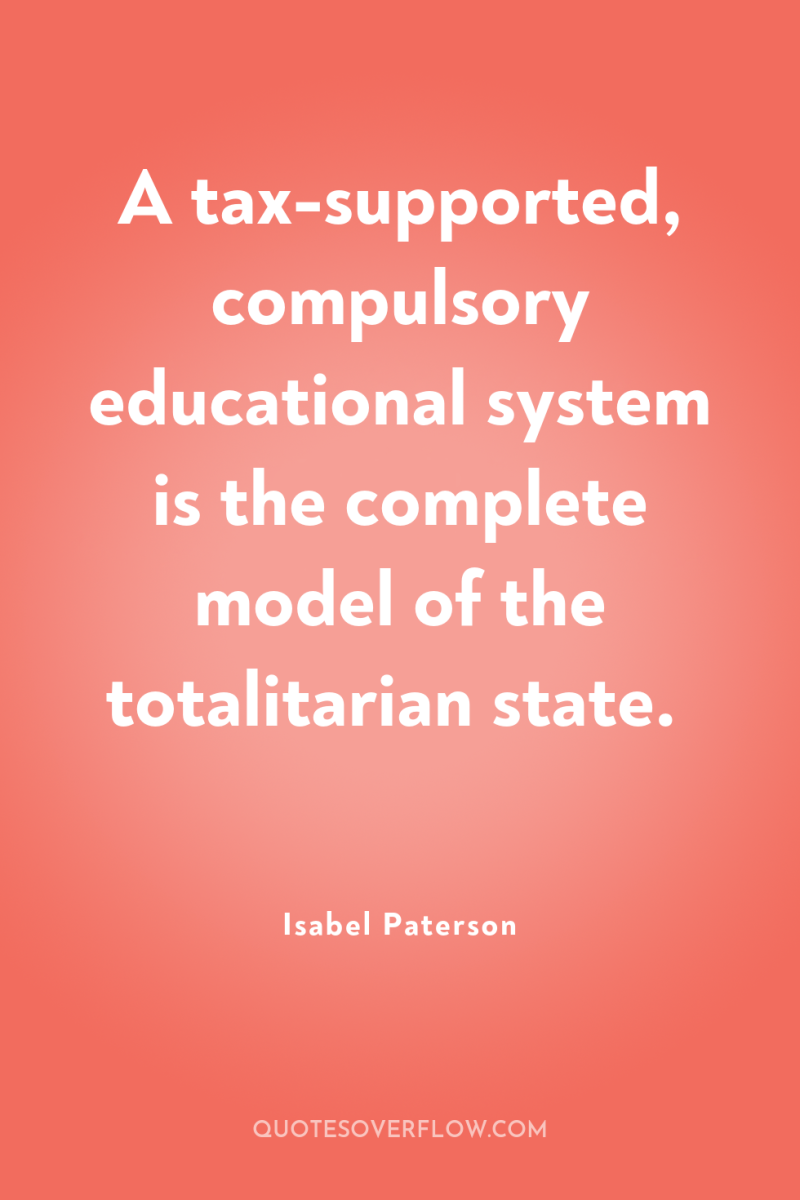
7
A tax-supported, compulsory educational system is the complete model of the totalitarian state.Isabel Paterson
8
Most schooling is training for stupidity and conformity, and that's institutional, but occasionally you get a spark, somebody'll challenge your mind, make you think and so on, and that has a tremendous effect you just reach all sorts of people. Of course if you do it you may very have problems, you have to tread the narrow line. There are plenty of people who don't want students to think, they're afraid of the crisis of democracy. If people start thinking you get all these problems that I quoted before. They won't have enough humility to submit to a civil rule or they'll start trying to press their demands in the political arena and have ideas of their own, instead of beleiving what they're told. And privelage and power typically doesn't want that and so they react and the high school teacher that tries to get students to think may find oppression, firing and so on.Noam Chomsky
9
Politicians in our times feed their clichés to television, where even those who wish to disagree repeat them. Television purports to challenge political language by conveying images, but the succession from one frame to another can hinder a sense of resolution. Everything happens fast, but nothing actually happens. Each story on televised news is ”breaking” until it is displaced by the next one. So we are hit by wave upon wave but never see the ocean. The effort to define the shape and significance of events requires words and concepts that elude us when we are entranced by visual stimuli. Watching televised news is sometimes little more than looking at someone who is also looking at a picture. We take this collective trance to be normal. We have slowly fallen into it. More than half a century ago, the classic novels of totalitarianism warned of the domination of screens, the suppression of books, the narrowing of vocabularies, and the associated difficulties of thought. In Ray Bradbury’s Fahrenheit 451, published in 1953, firemen find and burn books while most citizens watch interactive television. In George Orwell’s 1984, published in 1949, books are banned and television is two-way, allowing the government to observe citizens at all times. In 1984, the language of visual media is highly constrained, to starve the public of the concepts needed to think about the present, remember the past, and consider the future. One of the regime’s projects is to limit the language further by eliminating ever more words with each edition of the official dictionary. Staring at screens is perhaps unavoidable, but the two-dimensional world makes little sense unless we can draw upon a mental armory that we have developed somewhere else. When we repeat the same words and phrases that appear in the daily media, we accept the absence of a larger framework. To have such a framework requires more concepts, and having more concepts requires reading. So get the screens out of your room and surround yourself with books. The characters in Orwell’s and Bradbury’s books could not do this–but we still can. .Timothy Snyder
10
At a time I used to think that in a world without guards people would walk differently from the way we do in our country. Where people are allowed to think and write differently, I thought, they will also walk differently.Unknown
11
A Stalin functionary admitted, "Innocent people were arrested: naturally - otherwise no one would be frightened. If people, he said, were arrested only for specific misdemeanours, all the others would feel safe and so become ripe for treason.Paul Johnson
12
Stalin’s Russia was a trap, in which even those running the system were caught. The leaders were trapped by fear of Stalin and even he was trapped by his fear of their desire to be rid of him. Everything he had to eat or drink had to be tasted by one of his colleagues first. Beria’s behavior at his death showed that his fear was only partly paranoia.Jonathan Glover
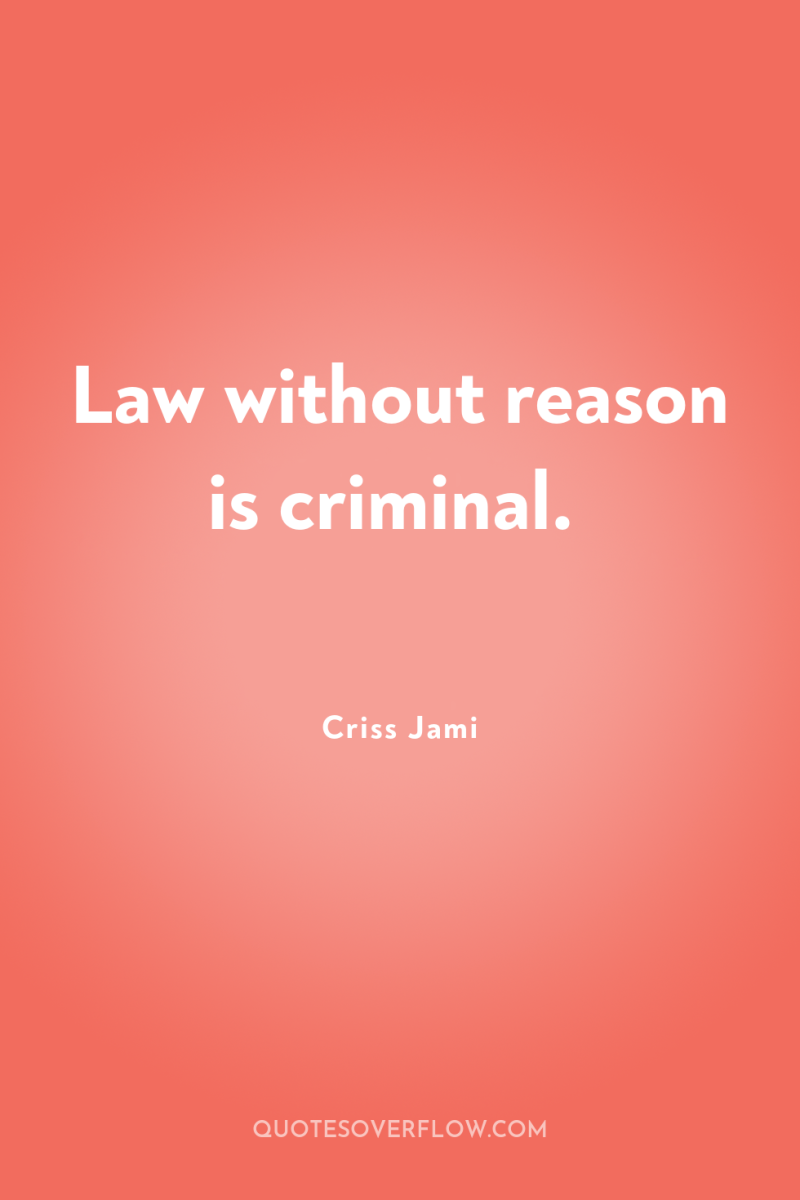
13
Law without reason is criminal.Criss Jami
14
Our forefathers were heroes. But why were they heroes? Because they fought for democracy. They fought for the life and liberty of the Filipino people. They fought for our independence, our freedom. They fought against tyranny, totalitarianism, and dictatorship. They fought for us and that is something we must be grateful for.Yanan Melo
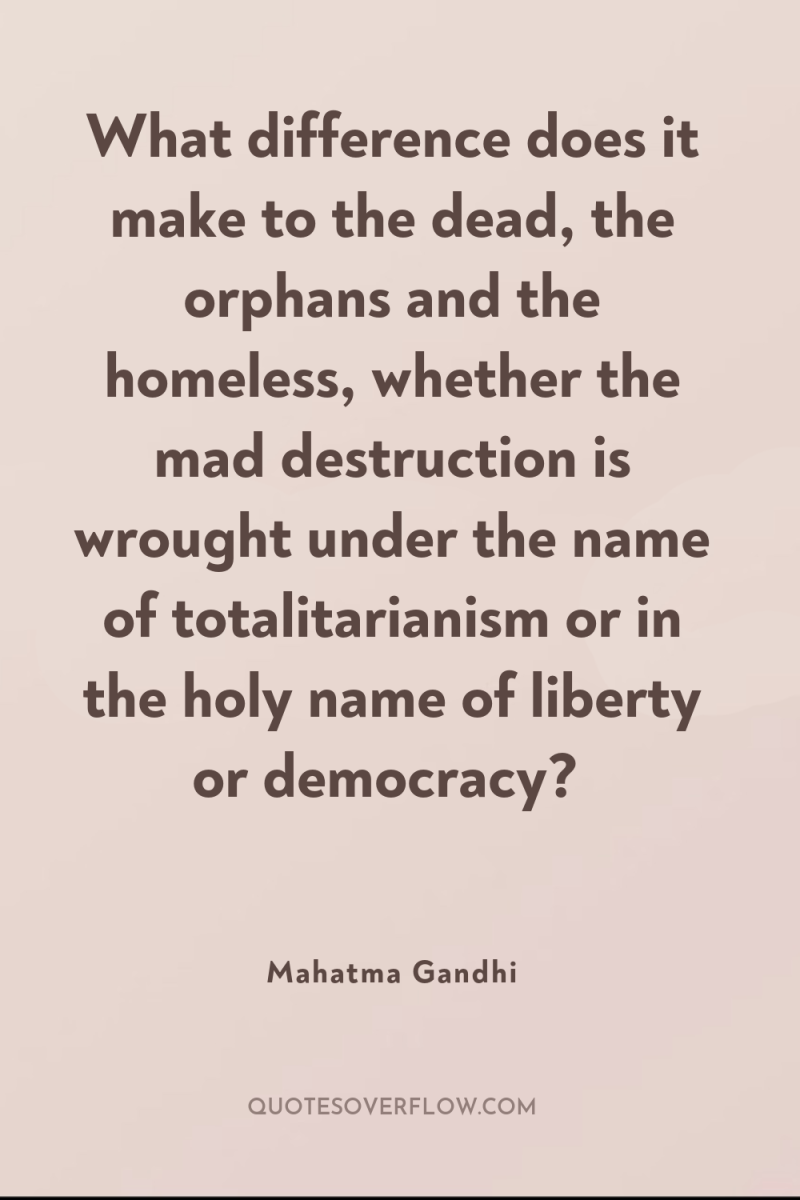
15
What difference does it make to the dead, the orphans and the homeless, whether the mad destruction is wrought under the name of totalitarianism or in the holy name of liberty or democracy?Mahatma Gandhi
16
It was sometimes feebly argued, as the political and military war against this enemy ran into difficulties, that it was 'a war without end.' I never saw the point of this plaintive objection. The war against superstition and the totalitarian mentality is an endless war. In protean forms, it is fought and refought in every country and every generation. In bin Ladenism we confront again the awful combination of the highly authoritarian personality with the chaotically nihilist and anarchic one. Temporary victories can be registered against this, but not permanent ones. As Bertold Brecht's character says over the corpse of the terrible Arturo Ui, the bitch that bore him is always in heat. But it is in this struggle that we develop the muscles and sinews that enable us to defend civilization, and the moral courage to name it as something worth fighting for. .Christopher Hitchens
17
The entire stock of relationships which suited in war–militiae–was regarded as inadmissible and improper in peace–domi. We have the measure of how right the Romans were in this respect in the experience of the intellectual and moral impoverishment brought about by total mobilisation.Bertrand De Jouvenel
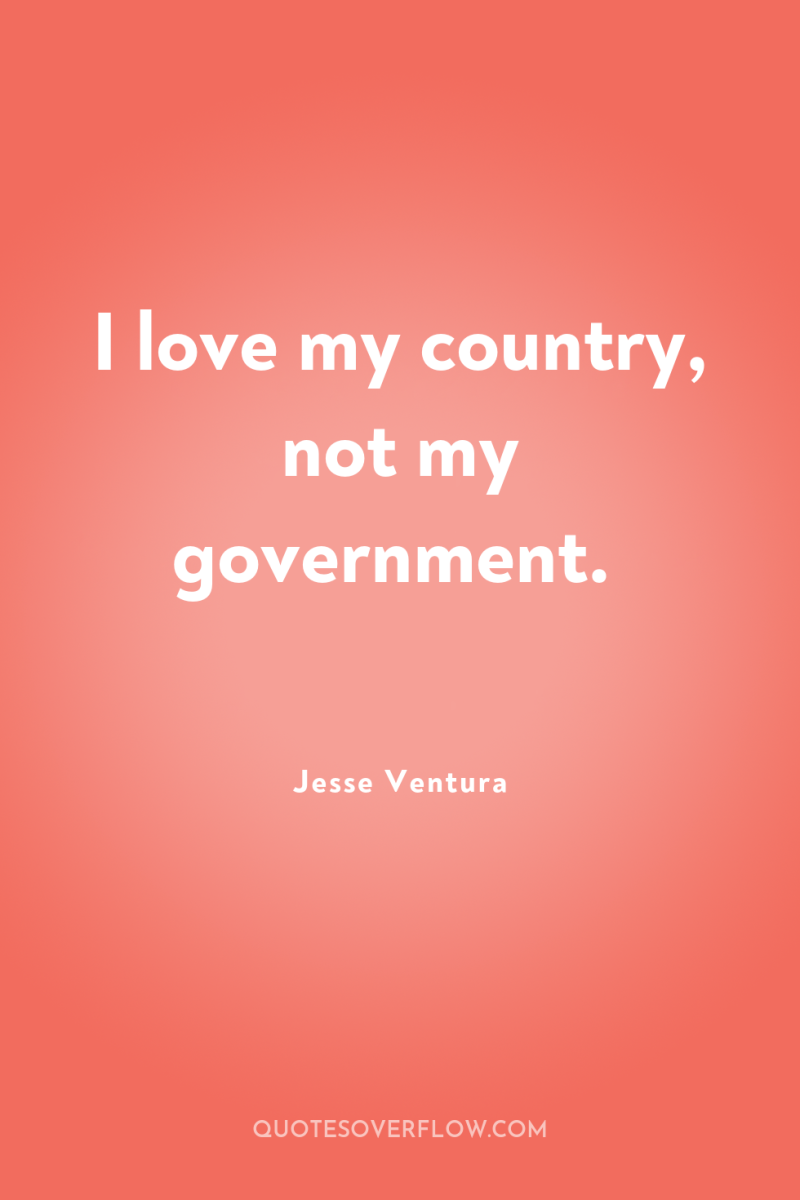
18
I love my country, not my government.Jesse Ventura
19
The amount of violations of human rights in a country is always an inverse function of the amount of complaints about human rights violations heard from there. The greater the number of complaints being aired, the better protected are human rights in that country.Daniel Patrick Moynihan
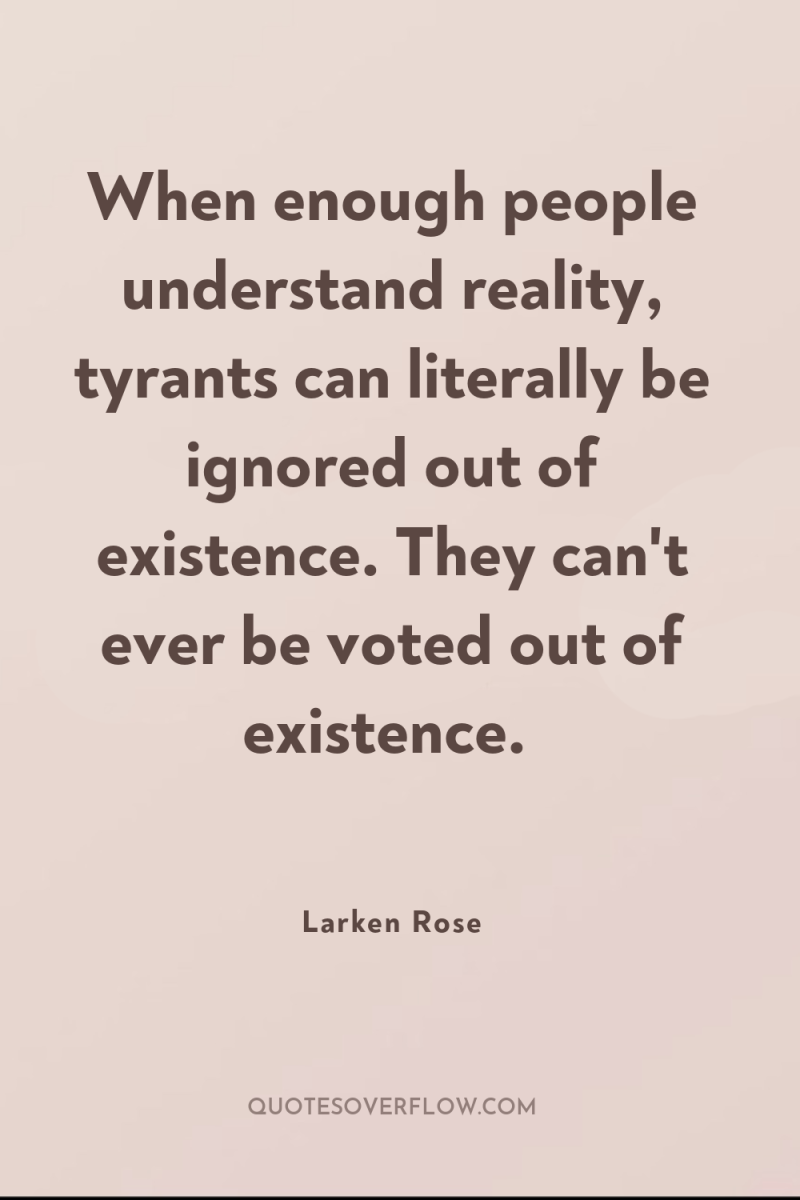
20
When enough people understand reality, tyrants can literally be ignored out of existence. They can't ever be voted out of existence.Larken Rose
21
Religion, a mediaeval form of unreason, when combined with modern weaponry becomes a real threat to our freedoms. This religious totalitarianism has caused a deadly mutation in the heart of Islam and we see the tragic consequences in Paris today. I stand with Charlie Hebdo, as we all must, to defend the art of satire, which has always been a force for liberty and against tyranny, dishonesty and stupidity. ‘Respect for religion’ has become a code phrase meaning ‘fear of religion.’ Religions, like all other ideas, deserve criticism, satire, and, yes, our fearless disres.Salman Rushdie
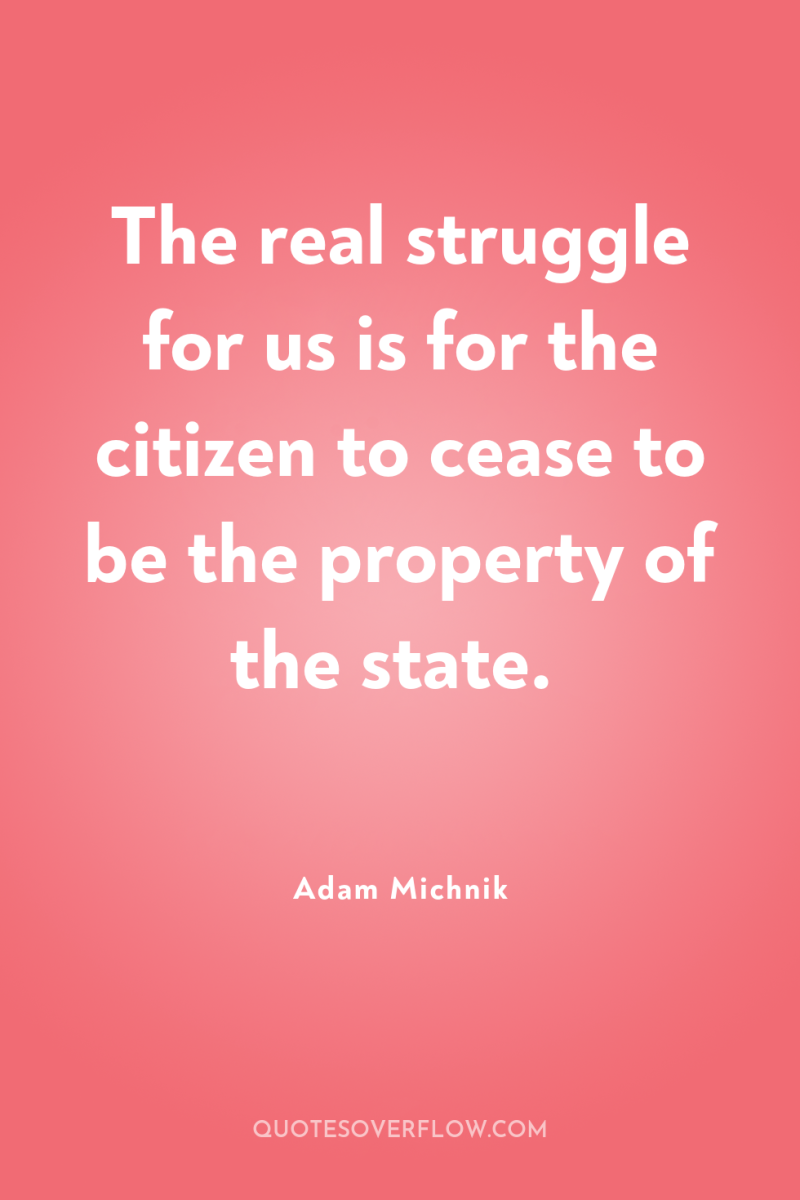
22
The real struggle for us is for the citizen to cease to be the property of the state.Adam Michnik
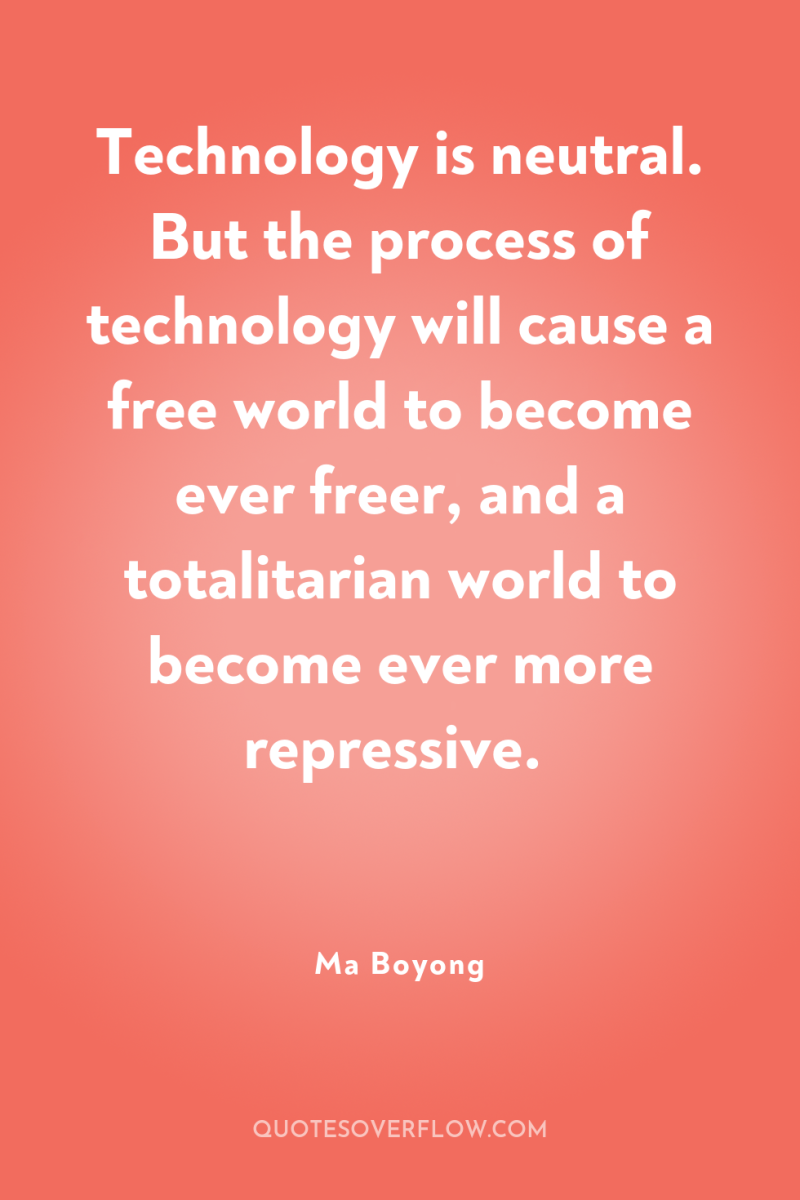
23
Technology is neutral. But the process of technology will cause a free world to become ever freer, and a totalitarian world to become ever more repressive.Ma Boyong
24
Socialists seem to think George Orwell’s 1984 is a suggestion, or at least are unashamed of mimicking the methods of the totalitarian state Orwell depicted. Libertarians know it to be a warning, and a government that micro-manages all aspects of humanity an intolerable reality.A.E. Samaan
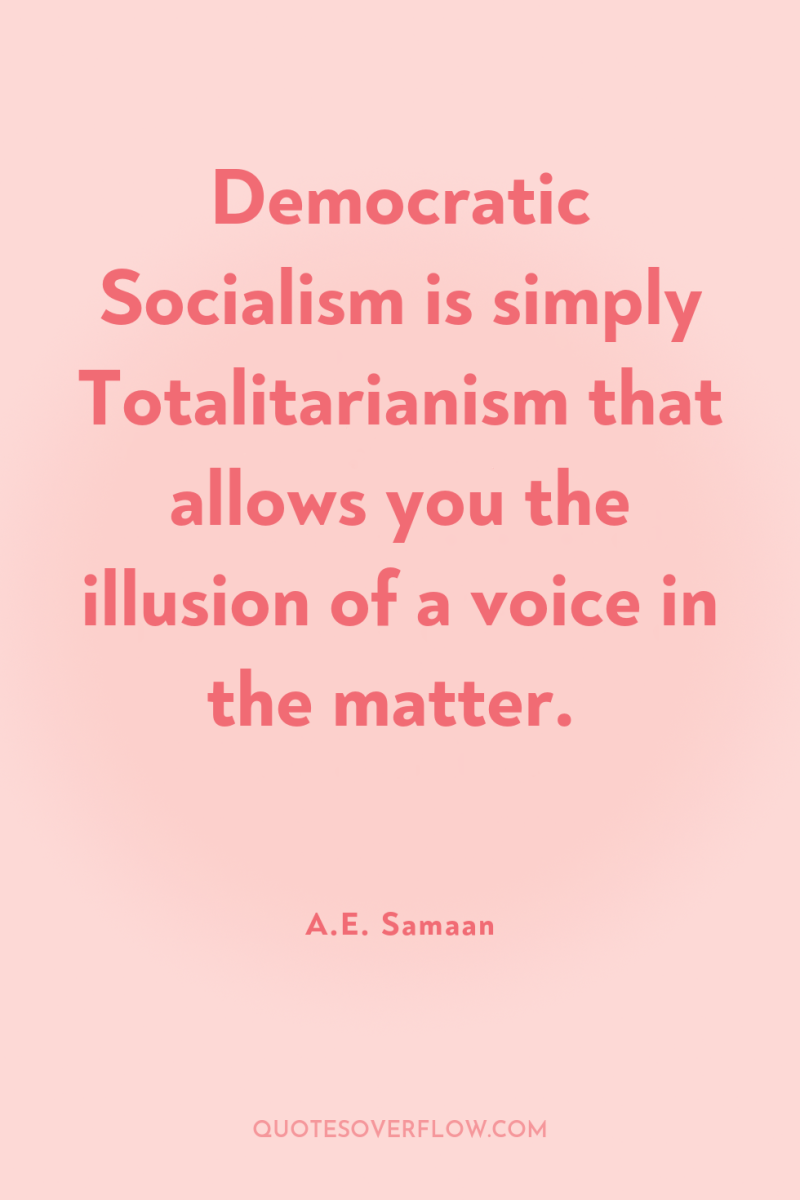
25
Democratic Socialism is simply Totalitarianism that allows you the illusion of a voice in the matter.A.E. Samaan
26
Government as we now know it in the USA and other economically advanced countries is so manifestly horrifying, so corrupt, counterproductive, and outright vicious, that one might well wonder how it continues to enjoy so much popular legitimacy and to be perceived so widely as not only tolerable but indispensable. The answer, in overwhelming part, may be reduced to a two-part formula: bribes and bamboozlement (classically "bread and circuses"). Under the former rubric falls the vast array of government "benefits" and goodies of all sorts, from corporate subsidies and privileges to professional grants and contracts to welfare payments and health care for low-income people and other members of the lumpenproletariat. Under the latter rubric fall such measures as the government schools, the government's lapdog news media, and the government's collaboration with the producers of professional sporting events and Hollywood films. Seen as a semi-integrated whole, these measures give current governments a strong hold on the public's allegiance and instill in the masses and the elites alike a deep fear of anything that seriously threatens the status quo.Robert Higgs
27
Never has our future been more unpredictable, never have we depended so much on political forces that cannot be trusted to follow the rules of common sense and self-interest–forces that look like sheer insanity, if judged by the standards of other centuries. It is as though mankind had divided itself between those who believe in human omnipotence (who think that everything is possible if one knows how to organize masses for it) and those for whom powerlessness has become the major experience of their lives.Hannah Arendt
28
On the 'Celestial Seasonings' green tea packet there is a short explanation of its benefits: 'Green tea is a natural source of antioxidants, which neutralize harmful molecules in the body known as free radicals. By taming free radicals, antioxidants help the body maintain its natural health.' Mutatis mutandis, is not the notion of totalitarianism one of the main ideological antioxidants, whose function throughout its career was to tame free radicals, and thus to help the social body to maintain its politico-ideological good health? .Unknown
29
I used to call myself a single-issue voter on the essential question of defending civilization against its terrorist enemies and their totalitarian protectors, and on that 'issue' I hope I can continue to expose and oppose any ambiguity.Christopher Hitchens
30
Every line of serious work that I have written since 1936 has been written, directly or indirectly, against totalitarianism and for democratic socialism, as I understand it. It seems to me nonsense, in a period like our own, to think that one can avoid writing of such subjects. Everyone writes of them in one guise or another. It is simply a question of which side one takes and what approach one follows. And the more one is conscious of one's political bias, the more chance one has of acting politically without sacrificing one's aesthetic and intellectual integrity.George Orwell
31
Such is the control, and such the public mentality, enjoyed by the Swedish planners. The rulers of the Soviet Union, although favoured by despotic power, are not so fortunate. Obstructively resentful of officialdom, the Russian, in the words of the Spanish saying, has always known how orders are 'to be obeyed but not carried out'. To the Swede, that sort of compromise is downright immoral. His elected leaders have received those political blessings denied the autocrats in the Kremlin: compliant citizens and an unopposed bureaucracy.Roland Huntford
32
That unique Moscow mix of tackiness and menace. One time I see a poster advertising a new property development that captures the tone nicely. Got up in the style of Nazi propaganda, it shows two Germanic-looking youths against a glorious alpine mountain over the slogan "Life is Getting Better". It would be wrong to say the ad is humorous, but it's not quite serious either. It's sort of both. It's saying this is the society we live in (a dictatorship), but we're just playing at it (we can make jokes about it), but playing in a serious way (we're making money playing it and won't let anyone subvert its rules).Peter Pomerantsev
33
I cannot, of course, prove that there is no supervising deity who invigilates my every momentand who will pursue me even after I am dead. (I can only be happy that there is no evidence forsuch a ghastly idea, which would resemble a celestial North Korea in which liberty was not justimpossible but inconceivable.) But nor has any theologian ever demonstrated the contrary. Thiswould perhaps make the believer and the doubter equal–except that the believer claims to know, not just that God exists, but that his most detailed wishes are not merely knowable but actuallyknown. Since religion drew its first breath when the species lived in utter ignorance andconsiderable fear, I hope I may be forgiven for declining to believe that another human being cantell me what to do, in the most intimate details of my life and mind, and to further dictate theseterms as if acting as proxy for a supernatural entity. This tyrannical idea is very much older than P a g e | 5 of 29Christianity, of course, but I do sometimes think that Christians have less excuse for believing, letalone wishing, that such a horrible thing could be true.Christopher Hitchens
34
The believer claims to know, not just that God exists, but that his most detailed wishes are not merely knowable but actually known. Since religion drew its first breath when the species lived in utter ignorance and considerable fear, I hope I may be forgiven for declining to believe that another human being can tell me what to do, in the most intimate details of my life and mind, and to further dictate these terms as if acting as proxy for a supernatural entity.Christopher Hitchens
35
Caution in handling generally accepted opinions that claim to explain whole trends of history is especially important for the historian of modern times, because the last century has produced an abundance of ideologies that pretend to be keys to history but are actually nothing but desperate efforts to escape responsibility.Hannah Arendt
36
Knowledge can never imprison you, but you can be captive to your ignorance.A.E. Samaan
37
The crisis of history in France, is a crisis of social bond, a crisis of citizenship. A citizen is the heir of a past more or less mythified, but he makes his own, whatever his personal genealogy. Today, under the pretext that the country has undergone considerable changes, some would like to transform the past in order to adopt it to the new face of France. Nothing, however, will make the past anything other than what it was. To pretend to change history is a totalitarian project: One who has control of the past has control over the future, one who has control over the present has control over the past, as George Orwell wrote in 1984.Jean Sevillia
38
The most striking difference between the ancient and modern sophists is that the ancients were satisfied with a passing victory of the argument at the expense of truth, whereas the moderns want a more lasting victory at the expense of reality. In other words, one destroyed the dignity of human thought whereas the others destroy the dignity of human action. The old manipulators of logic were the concern of the philosopher, whereas the modern manipulators of facts stand in the way of the historian. For history itself is destroyed, and its comprehensibility–based upon the fact that it is enacted by men and therefore can be understood by men–is in danger, whenever facts are no longer held to be part and parcel of the past and present world, and are misused to prove this or that opinion. .Hannah Arendt
39
Any religion-based state has a mission to limit the minds of its people, to fight the developments of history and logic, and to dumb down its citizens. It’s important to stand in the way of such a mentality, to deny it from continuing its mission to murder the souls of its people, killing them deep within while they are still alive and breathing.Raif Badawi
40
States that are built on a religious foundation limit their own people in a circle of faith and fear.Raif Badawi
41
The people who must never have power are the humorless. To impossible certainties of rectitude they ally tedium and uniformity.Christopher Hitchens
42
Because the horror of Communism, Stalinism, is not that bad people do bad things – they always do. It's that good people do horrible things thinking they are doing something gUnknown
43
The point is as long as it doesn’t affect others in a negative manner then just do what you enjoy doing as often as possible, it’s simple. That philosophy should underpin society and it’s something that nanny states just don’t get — that life’s about enjoying yourself and if what you find enjoyable isn’t harming anyone else then it should be of no interest to the stateRobert Breeze
44
It’s ridiculous to talk about freedom in a society dominated by huge corporations. What kind of freedom is there inside a corporation? They’re totalitarian institutions - you take orders from above and maybe give them to people below you. There’s about as much freedom as under Stalinism.Noam Chomsky
45
If you want a vision of the future, imagine a boot stamping on a human face--forever.George Orwell
46
A totalitarian society which succeeded in perpetuating itself would probably set up a schizophrenic system of thought, in which the laws of common sense held good in everyday life and in certain exact sciences, but could be disregarded by the politician, the historian, and the sociologist. Already there are countless people who would think it scandalous to falsify a scientific textbook, but would see nothing wrong in falsifying an historical fact. It is at the point where literature and politics cross that totalitarianism exerts its greatest pressure on the intellectual. The exact sciences are not, at this date, menaced to anything like the same extent. This partly accounts for the fact that in all countries it is easier for the scientists than for the writers to line up behind their respective governments.George Orwell
47
Many things in this period have been hard to bear, or hard to take seriously. My own profession went into a protracted swoon during the Reagan-Bush-Thatcher decade, and shows scant sign of recovering a critical faculty–or indeed any faculty whatever, unless it is one of induced enthusiasm for a plausible consensus President. (We shall see whether it counts as progress for the same parrots to learn a new word.) And my own cohort, the left, shared in the general dispiriting move towards apolitical, atonal postmodernism. Regarding something magnificent, like the long-overdue and still endangered South African revolution (a jagged fit in the supposedly smooth pattern of axiomatic progress), one could see that Ariadne’s thread had a robust reddish tinge, and that potential citizens had not all deconstructed themselves into Xhosa, Zulu, Cape Coloured or ‘Eurocentric’; had in other words resisted the sectarian lesson that the masters of apartheid tried to teach them. Elsewhere, though, it seemed all at once as if competitive solipsism was the signifier of the ‘radical’; a stress on the salience not even of the individual, but of the trait, and from that atomization into the lump of the category. Surely one thing to be learned from the lapsed totalitarian system was the unwholesome relationship between the cult of the masses and the adoration of the supreme personality. Yet introspective voyaging seemed to coexist with dull group-think wherever one peered about among the formerly ‘committ.Christopher Hitchens
48
Sooner or later, all talk among foreigners in Pyongyang turns to one imponderable subject. Do the locals really believe what they are told, and do they truly revere Fat Man and Little Boy? I have been a visiting writer in several authoritarian and totalitarian states, and usually the question answers itself. Someone in a café makes an offhand remark. A piece of ironic graffiti is scrawled in the men's room. Some group at the university issues some improvised leaflet. The glacier begins to melt; a joke makes the rounds and the apparently immovable regime suddenly looks vulnerable and absurd. But it's almost impossible to convey the extent to which North Korea just isn't like that. South Koreans who met with long-lost family members after the June rapprochement were thunderstruck at the way their shabby and thin northern relatives extolled Fat Man and Little Boy. Of course, they had been handpicked, but they stuck to their line. There's a possible reason for the existence of this level of denial, which is backed up by an indescribable degree of surveillance and indoctrination. A North Korean citizen who decided that it was all a lie and a waste would have to face the fact that his life had been a lie and a waste also. The scenes of hysterical grief when Fat Man died were not all feigned; there might be a collective nervous breakdown if it was suddenly announced that the Great Leader had been a verbose and arrogant fraud. Picture, if you will, the abrupt deprogramming of more than 20 million Moonies or Jonestowners, who are suddenly informed that it was all a cruel joke and there's no longer anybody to tell them what to do. There wouldn't be enough Kool-Aid to go round. I often wondered how my guides kept straight faces. The streetlights are turned out all over Pyongyang–which is the most favored city in the country–every night. And the most prominent building on the skyline, in a town committed to hysterical architectural excess, is the Ryugyong Hotel. It's 105 floors high, and from a distance looks like a grotesquely enlarged version of the Transamerica Pyramid in San Francisco (or like a vast and cumbersome missile on a launchpad). The crane at its summit hasn't moved in years; it's a grandiose and incomplete ruin in the making. 'Under construction, ' say the guides without a trace of irony. I suppose they just keep two sets of mental books and live with the contradiction for now.Christopher Hitchens
49
Even though Christ Himself would not deliver us from the power of the Totalitarian State, as He did not deliver Himself, we must see His purpose in it all. Maybe his children are being persecuted by the world in order that they might withdraw themselves from the world. Maybe His most violent enemies may be doing His work negatively, for it could be the mission of totalitarianism to preside over the liquidation of a modern world that became indifferent to God and His moral laws.Fulton J. Sheen
50
Our contemporary poverty is as transparent as glass and as invisible as the air. Our poverty is kilometer-long lines, the constant elbowing, spiteful officials, trains late without reason, the water cut off by some disaster (..), the monotony of living without any hope whatsoever, the decaying historic cities, the provinces emptying the rivers poisoned. Our poverty is the grace of the totalitarian state by whose grace we live.Tadeusz Konwicki
51
Dr. Kim couldn't remember the last time she'd seen a bowl of pure white rice. What was a bowl of rice doing there, just sitting out on the ground? She figured it out just before she heard the dog's bark. Up until that moment, a part of her had hoped that China would be just as poor as North Korea. She still wanted to believe that her country was the best place in the world. The beliefs she had cherished for a lifetime would be vindicated. But now she couldn't deny what was staring her plainly in the face: dogs in China ate better than doctors in North Korea. .Barbara Demick
52
Well, as Hannah Arendt famously said, there can be a banal aspect to evil. In other words, it doesn't present always. I mean, often what you're meeting is a very mediocre person. But nonetheless, you can get a sort of frisson of wickedness from them. And the best combination of those, I think, I describe him in the book, is/was General Jorge Rafael Videla of Argentina, who I met in the late 1970s when the death squad war was at its height, and his fellow citizens were disappearing off the street all the time. And he was, in some ways, extremely banal. I describe him as looking like a human toothbrush. He was a sort of starch, lean officer with a silly mustache, and a very stupid look to him, but a very fanatical glint as well. And, if I'd tell you why he's now under house arrest in Argentina, you might get a sense of the horror I felt as I was asking him questions about all this. He's in prison in Argentina for selling the children of the rape victims among the private prisoners, who he kept in a personal jail. And I don't know if I've ever met anyone who's done anything as sort of condensedly horrible as that.Christopher Hitchens
53
The Revolution will be complete when the language is perfect.George Orwell
54
Every thought that deviates from the officially prescribed and permanently changing line is already suspect, no matter in which field of human activity it occurs. Simply because of their capacity to think, human beings are suspects by definition, and this suspicion cannot be diverted by exemplary behavior, for the human capacity to think is also a capacity to change one's mind.Hannah Arendt
55
Yes, our country has its shortcomings, but there's no moral equivalency between democracy and totalitarianism… There's no moral equivalency between propaganda and the truth.Ronald Reagan
56
The distrust of wit is the beginning of tyranny.Edward Abbey
57
The opposite of Nazi is neither Republican nor Democrat, conservative or liberal. Totalitarianism's diametric opposite of is Libertarianism.A.E. Samaan
58
It is curious to note that when for reasons of conscience, people refuse to kill, they are often exempted from active military duty. But there are no exemptions for people who, for reasons of conscience, refuse to financially support the bureaucracy that actually does the killing. Apparently, the state takes money more seriously than life.Karl Hess
59
Every socialist is a disguised dictator.Ludwig Von Mises
60
Every culture has its distinctive and normal system of government. Yours is democracy, moderated by corruption. Ours is totalitarianism, moderated by assassination.Unknown Russian
61
If no divine law is recognized above the law of the State, then the law of man has become absolute in men's eyes--there is then no logical barrier to totalitarianism.Greg L. Bahnsen
62
And it was not merely tens of thousands, or hundreds of thousands, but hundreds of millions of people who were the obedient witnesses of this slaughter of the innocent. Nor were they merely obedient witnesses: when ordered to, they gave their support to this slaughter, voting in favour of it amid a hubbub of voices. There was something unexpected in their degree of obedience.. The extreme violence of the totalitarian social systems proved able to paralyse the human spirit throughout whole continents. .Vasily Grossman
63
War, Nobby. Huh! What is it good for?" he said. "Dunno, Sarge. Freeing slaves, maybe?"" Absol–well, okay." "Defending yourself against a totalitarian aggressor?"" All right, I'll grant you that, but–"" Saving civilization from a horde of–" "It doesn't do any good in the long run is what I'm saying, Nobby, if you'd listen for five seconds together, " said Fred Colon sharply. "Yeah, but in the long run, what does, Sarge? .Terry Pratchett
64
Professional Ketman is reasoned thus: since I find myself in circumstances over which I have no control, and since I have but one life and that is fleeting, I should strive to do my best. I am like a crustacean attached to a crag on the bottom of the sea. Over me storms rage and huge ships sail; but my entire effort is concentrated upon clinging to the rock, for otherwise I will be carried off by the waters and perish, leaving no trace behind.Unknown
65
In the end the Party would announce that two and two made five, and you would have to believe it. It was inevitable that they should make that claim sooner or later: the logic of their position demanded it. Not merely the validity of experience, but the very existence of external reality, was tacitly denied by their philosophy. The heresy of heresies was common sense. And what was terrifying was not that they would kill you for thinking otherwise, but that they might be right. For, after all, how do we know that two and two make four? Or that the force of gravity works? Or that the past is unchangeable? If both the past and the external world exist only in the mind, and if the mind itself is controllable–what then? .George Orwell
66
Make no choice, and you have chosen. Failure to decide, because you lack the right, is itself a decision, First Councilor. In abstaining, you vote.George R.r. Martin
67
What drove such people to their sinister occupations? Spite? Certainly, but also the desire for order. Because the desire for order tries to transform the human world into an inorganic reign in which everything goes well, everything functions as a subject of an impersonal will. The desire for order is at the same time a desire for death, because life is a perpetual violation of order. Or, inversely, the desire for order is a virtuous pretext by which man's hatred for man justifies its crimes. .Milan Kundera
68
Socialism is "group-think." How uninformed in history do you have to be to advocate for "group-think"??A.E. Samaan
69
Very few tyrants argued for the slavery of the masses. Instead, they argued for their right to protect the people from themselves.A.E. Samaan
70
The central planners of Democratic Socialism tighten their noose when people resist their plans and assert their rights. All Socialism is intended to devolve into Communism, and as a result, Totalitarianism.A.E. Samaan
71
There is a very dangerous myth that #Hitler was solely fueled by racism. His desire to engineer society was pervasive. Racism alone cannot explain what happened in The Holocaust without also addressing Hitler's statist policies.A.E. Samaan
72
You can either have individual liberty, or dependence on the government. One is designed to undo the other.A.E. Samaan
73
Communism is what happens when Socialists realize that they want complete control over every aspect of human life.A.E. Samaan
74
A "centrally planned economy" by definition discourages and despises participation by the masses. It's a bureaucratic oligarchy.A.E. Samaan
75
Freedom is indivisible. As soon as one starts to restrict it, one enters upon a decline on which it is difficult to stop.Ludwig Von Mises
76
In this confusion we begin to see what lies behind John Paul II's startling warning about democracy "effectively mov[ing] towards a form of totalitarianism." It begins to happen at a practical level when we simultaneously hold that rights which arise from the dignity of the person are also a matter of "bargaining." New rights can be claimed or created, and whatever privileges can be negotiated around them are then secured by reference to human dignity, even when these new rights are directly contrary to the human dignity of some, for example, the unborn or the elderly sick. This confusion about the nature of rights debases their currency and undermines the first principles of democracy. Such freedom gradually becomes a tyrannical "freedom of the 'the strong' against the weak, who have no choice but to submit.George Cardinal Pell
77
America isn’t that far from totalitarianism.Garth Risk Hallberg
78
A democracy without values easily turns into open or thinly disguised totalitarianism.John Paul II
79
Big Government' is a lot less like a 'Big Brother', and a lot more like a mother-in-law.A.E. Samaan
80
Propaganda is to a democracy what the bludgeon is to a totalitarian state.Noam Chomsky
81
The right of dissent, or, if you prefer, the right to be wrong, is surely fundamental to the existence of a democratic society. That’s the right that went first in every nation that stumbled down the trail toward totalitarianism.Edward R. Murrow
82
Every time I do an interview people ask similar questions, such as "What is the most significant story that you have revealed?" […] There really is only one overarching point that all of these stories have revealed, and that is—and I say this without the slightest bit of hyperbole or melodrama; it's not metaphorical and it's not figurative; it is literally true—that the goal of the NSA and it's five eyes partners in the English speaking world— Canada, New Zealand, Australia and especially the UK—is to eliminate privacy globally, to ensure that there could be no human communications that occur electronically, that evades their surveillance net; they want to make sure that all forms of human communications by telephone or by Internet, and all online activities are collected, monitored, stored and analyzed by that agency and by their allies. That means, to describe that is to describe a ubiquitous surveillance state; you don't need hyperbole to make that claim, and you do not need to believe me when I say that that's their goal. Document after document within the archive that Edward Snowden provided us declare that to be their goal. They are obsessed with searching out any small little premise of the planet where some form of communications might take place without they being able to invade it. .Glenn Greenwald
83
In 1870, came the victory of the short-service troops of Prussia over the long-service troops of France, where conscription had but recently been reintroduced in a partial form and as a supplementary measure. That obvious contrast carried more weight into the world than all the other factors which tilted the scales against France. As a result, universal peace-time conscription was adopted by almost all countries as the basis of their military system. This ensured that wars would grow bigger in scale, longer in duration, and worse in effects. While conscription appeared democratic, it provided autocrats, hereditary or revolutionary, with more effective and comprehensive means of imposing their will, both in peace and war. Once the rulp of compulsory service in arms was established for the young men of a nation, it was an obvious and easy transition to the servitude of the whole population. Totalitarian tyranny is the twin of total warfare–which might aptly be termed a reversion to tribal warfare on a larger scale. .B.H. Liddell Hart
84
Universal peace-time conscription was adopted by almost all countries as the basis of their military system. This ensured that wars would grow bigger in scale, longer in duration, and worse in effects. While conscription appeared democratic, it provided autocrats, hereditary or revolutionary, with more effective and comprehensive means of imposing their will, both in peace and war. Once the rule of compulsory service in arms was established for the young men of a nation, it was an obvious and easy transition to the servitude of the whole population. Totalitarian tyranny is the twin of total warfare –which might aptly be termed a reversion to tribal warfare on a larger scale.B.H. Liddell Hart
85
But democrats are seldom welcome on planets run by totalitarian governments, and scarcely more welcome on planets where anarchy prevails--this is due to the very nature of democracy, the only practical compromise between totalitarianism and anarchy.Christopher Stasheff
86
Equality of condition, though it is certainly a basic requirement for justice, is nevertheless among the greatest and most uncertain ventures of modern mankind. The more equal conditions are, the less explanation there is for the differences that actually exist between people; and thus all the more unequal do individuals and groups become. This perplexing consequence came fully to light as soon as equality was no longer seen in terms of an omnipotent being like God or an unavoidable common destiny like death. Whenever equality becomes a mundane fact in itself, without any gauge by which it may be measured or explained, then there is one chance in a hundred that it will be recognized simply as a working principle of a political organization in which otherwise unequal people have equal rights; there are ninety-nine chances that it will be mistaken for an innate quality of every individual, who is “normal” if he is like everybody else and “abnormal” if he happens to be different. This perversion of equality from a political into a social concept is all the more dangerous when a society leaves but little space for special groups and individuals, for then their differences become all the more conspicuous.Hannah Arendt
87
For an ideology differs from a simple opinion in that it claims to possess either the key to history, or the solution for all the "riddles of the universe, " or the intimate knowledge of the hidden universal laws which are supposed to rule nature and man. Few ideologies have won enough prominence to survive the hard competitive struggle of persuasion, and only two have come out on top and essentially defeated all others: the ideology which interprets history as an economic struggle of classes, and the other that interprets history as a natural fight of races. The appeal of both to large masses was so strong that they were able to enlist state support and establish themselves as official national doctrines. But far beyond the boundaries within which race-thinking and class-thinking have developed into obligatory patterns of thought, free public opinion has adopted them to such an extent that not only intellectuals but great masses of people will no longer accept a presentation of past or present facts that is not in agreement with either of these views. .Hannah Arendt
88
Why does The Holocaust persist in haunting our conscience? Why does it dominate the introspection of philosophers and historians alike? By the numbers alone, the murders were not unprecedented. At that juncture of 20th Century history, Stalin and Lenin had already brutally murdered tens of millions. The Holocaust fascinates not because of its numbers, but because of the means employed. At no point in time had an entire society dedicated its full might to the perpetual elimination of those unwanted elements of the population. Every aspect of Hitler’s National Socialism was geared towards cleansing and improving the breeding stock of Germania. Hitler’s National Socialist government was focused on the breeding, education, and training of a “master race.” The social, cultural, legislative, and industrial mechanisms of Hitler’s National Socialism were designed to perpetually “select” its populace. The central planners of National Socialism would “select” those that would live, those that would die, and those that would be sterilized slave labor. National Socialism was intended to have the “total” control to decide who would be allowed to procreate, and as a result, those that would be allowed to contribute to Hitler’s ideal society.A.E. Samaan
89
More to the point, one cannot understand The Holocaust without understanding the intentions, ideology, and mechanisms that were put in place in 1933. The eugenics movement may have come to a catastrophic crescendo with the Hitler regime, but the political movement, the world-view, the ideology, and the science that aspired to breed humans like prized horses began almost 100 years earlier. More poignantly, the ideology and those legal and governmental mechanisms of a eugenic world-view inevitably lead back to the British and American counterparts that Hitler’s scientists collaborated with. Posterity must gain understanding of the players that made eugenics a respectable scientific and political movement, as Hitler’s regime was able to evade wholesale condemnation in those critical years between 1933 and 1943 precisely because eugenics had gained international acceptance. As this book will evidence, Hitler’s infamous 1933 laws mimicked those already in place in the United States, Britain, Norway, Sweden, Finland, and Canada. So what is this scientific and political movement that for 100 years aspired to breed humans like dogs or horses? Eugenics is quite literally, as defined by its principal proponents, an attempt at “directing evolution” by controlling any aspect of human existence that affects human heredity. From its onset, Francis Galton, the cousin of Charles Darwin and the man credited with the creation of the science of eugenics, knew that the cause of eugenics had to be observed with religious fervor and dedication. As the quote on the opening pages of this book illustrates, a eugenicist must “intrude, intrude, intrude.” A vigilant control over anything and everything that affects the gene pool is essential to eugenics. The policies could not allow for the individual to enjoy self-government or self-determination any more than a horse breeder can allow the animals to determine whom to breed with. One simply cannot breed humans like horses without imbuing the state with the level of control a farmer has over its livestock, not only controlling procreation, but also the diet, access to medical services, and living conditions. .A.E. Samaan
90
The best way to turn the earth into hell is to turn the state into a god.Unknown
91
Only the unlimited accumulation of power could bring about the unlimited accumulation of capital.Hannah Arendt
92
Democratic Socialism devolves into totalitarian Socialism and eventually into full on Communism as people resist statism.A.E. Samaan
93
The more we gained knowledge of these new totalitarian systems of mass-rule, the more we realized not only their similarity of structure, but also the fact that we had to do with a type of dominance that had been known in earlier epochs. We discovered that what the ancients called “tyrannis, ” or 'cheirokratia, ” what Sulla or the tyrants of the Italian Rennaissance had practised, and what finally alarmed the world in the French Revolution and under Napoleon, had surprisingly many similarities with modern totalitarianism, although this latter had elements with which they cannot be compared, and although it possessed means of domination unknown in past ages.Unknown
94
Not even the most heavily-armed police state can exert brute force to all of its citizens all of the time. Meme management is so much subtler; the rose-tinted refraction of perceived reality, the contagious fear of threatening alternatives.Peter Watts
95
If the old saying is true, that what one generation learns in school is the philosophy of the next, then the philosophy of the next generation will be totalitarianism.John Whitehead
96
The prose is deeply inspired by the tension between post- totalitarianism and consumer democracy. I am constantly probing the soft fleshy parts of the American dream.Alina Stefanescu
97
The wolfhound century leaps at my shoulders, But I am no wolf by blood.Osip Mandelstam
98
The 20th Century proved that there is nothing more dangerous to the health of ethnic minority communities than big government.A.E. Samaan
99
Totalitarianism in power invariably replaces all first-rate talents, regardless of their sympathies, with those crackpots and fools whose lack of intelligence and creativity is still the best guarantee of their loyalty.Hanna Arendt
100
That’s what’s new. There used to be the option of opting out. But now that’s over. Completion is the end. We’re closing the circle around everyone–it’s a totalitarian nightmare.Dave Eggers